I was happy to be selected to represent Laurea in the in the 18-month training of international experts in inclusion related topics. The Inclusion ACAdemy wrapped up an 18-month training series at the final conference in Zagreb in 21-23 of May 2024. The training series was primarily addressing international relations officers, inclusion officers, disability officers, and alike.
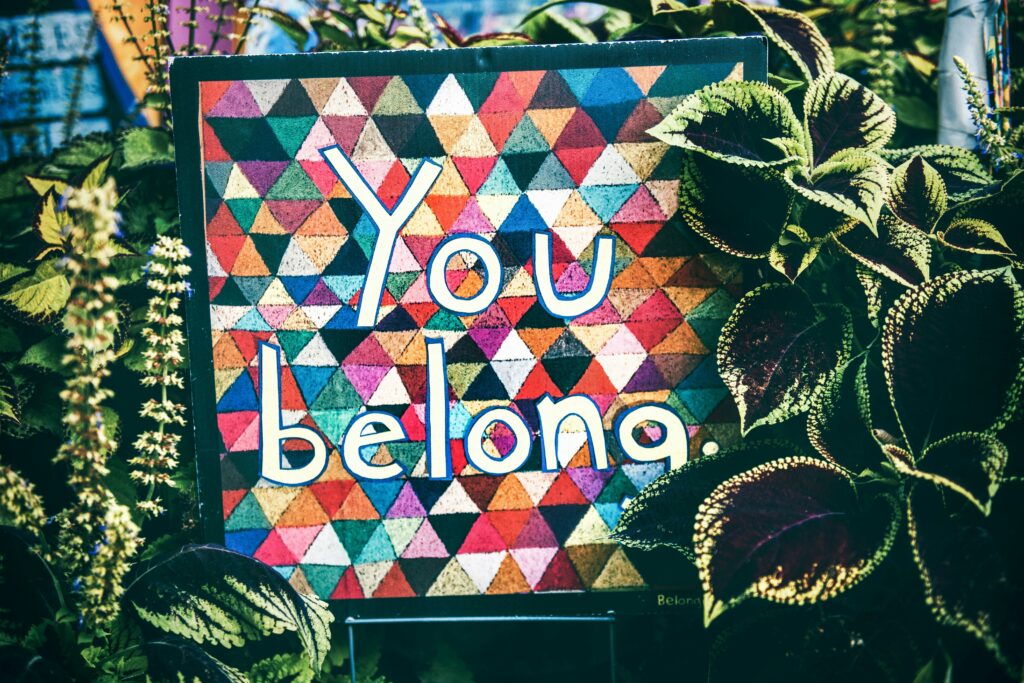 Photo by Tim Mossholder on Unsplash
Photo by Tim Mossholder on Unsplash
Kicking off in January 2023, the Inclusion ACAdemy brought together over 160 experts, academics, and inclusion officers from across Europe through a series of nine thematic webinars. These sessions covered vital topics, including the principles of inclusive mobility, support strategies, and inclusive communication. The final event, held on 22-23 May 2024, saw over 120 participants from six European countries converge to exchange ideas and solidify their networks. (ACA 2024.)
Program overview
The Inclusion ACAdemy was a training programme that started in March 2023 and continued until the first half of 2024. The Inclusion ACAdemy training on inclusion in international higher education taught participants how to implement practical approaches for increasing the diversity of participants in the Erasmus+ and other mobility programmes. The trainings, delivered by leading experts in the field of inclusive internationalization, took place in 2023 and first half of 2024. They consisted of a two-part introductory plenary online, three practical webinars and a final in-person event in Zagreb, Croatia.
The Inclusion ACAdemy was a tailor-made training series on the topic of inclusion and widening participation in international programmes designed for higher education institutions (HEIs) from Austria, Croatia, Finland, Germany, Iceland, and Slovenia. The training series have been created to support higher education institutions in implementing the Inclusion and Diversity horizontal priority of the Erasmus+ programme 2021 – 2027, but its outputs are also applicable for other mobility programmes. (ACA 2024.)
The trainings were delivered by experts in the field of inclusive internationalization. They included practitioners, academics, experts from the NAs and HEIs, representatives of supporting bodies and student organisations. (ACA 2024.)
The programme was coordinated by the Brussels-based Academic Cooperation Association (ACA), an umbrella organisation of 24 national-level funding organisations of international cooperation in higher education, and an expert centre in internationalisation, in cooperation with the Support Centre for Inclusive Higher Education (SIHO) and the SALTO Resource Centre for Inclusion and Diversity (Education and Training). The Croatian Agency for Mobility and EU Programmes (AMEUP) was the primary coordinator on behalf of the NA consortium consisting of Austria’s Agency for Education and Internationalisation (OeAD), Croatian Agency for Mobility and EU Programmes (AMEUP), Finnish National Agency for Education (EDUFI), German Academic Exchange Service (DAAD), The Icelandic Centre for Research (Rannís) and The Centre of the Republic of Slovenia for Mobility and European Educational and Training Programmes (CMEPIUS). (ACA 2024.)
Content
The training series addressed key topics on advancing inclusion and widening access to international higher education, and particularly of inclusive mobility, supporting further strategic action and professional development of the higher education sector in the six participating countries. The covered topics are in line with the Inclusion and Diversity Strategy of the Erasmus+ programme focusing on their implementation into different national and institutional contexts. They include identifying, supporting, and engaging students, academics, and staff with fewer opportunities, to increase their participation in international programmes. (ACA 2024.)
Structure
The series started with an online, two-part plenary session for all participants and continue with three rounds of thematically focused trainings. Each round featured three webinars with the same programme, and each of the webinars were opened to participants from the two participating countries. In the subsequent rounds, the participants from each of the countries will rotate to ensure mutual exchange between the participants from different countries. Finland was working together with Slovenia and later with Iceland.
The training series ended in May 2024 with an in-person event in Zagreb where all participants were able to reflect and discuss with their peers how to implement some of the lessons learnt in their respective institutions.
Roadmaps
During the training sessions, we had an opportunity to provide input for creating a roadmap of activities focusing on further developing inclusion in international higher education after the end of the training in cooperation with their NA, meaning Finnish National Agency for Education (Opetushallitus).
Training sessions
During the Introductory plenary week in March 2023, the aim was to provide an overview of current debates and terminological nuances within different approaches to inclusion, equity, and diversity (including inclusive mobility) in the first part and to discuss the current policy setup in the Erasmus+ programme and Bologna Process, as well as at national and institutional levels in the second part of the plenary session.
After that we discussed the fundamental concepts (inclusion, equity, diversity) and how they reflect in the day-to-day life of a higher education institution with the speeches of Christopher Johnstone, Associate Professor in the Comparative and International Development Education, University of Minnesota and Eva Janebova, Director, Centre for Inclusive Excellence, Palacky University Olomouc.
On March 16, 2023, we had the lecture “What is inclusive mobility and how to move forward?” by Valerie Van Hees, Coordinator, The Support Centre for Inclusive Higher Education (SIHO). In this session we discussed early adopters of inclusion matters. We learned that in 2009 in a Flemish community they stated to promote inclusion in focus of universal learning and design, peer learning, learning networks, European cooperations, mental health in higher education. The government validated and monitored the goal that 33 per cent of students should belong to under representative groups. The measures help to highlight the importance of supporting the under representative groups. The next session presented research findings about social inequalities in international student mobility and internationalization at home by Nicolai Netz, Head of Junior Research Group, The German Centre for Higher Education Research and Science Studies (DZHW) and Christof Van Mol, Assistant Professor at Tilburg University.
The 1st training session, 15 May 2023, was about inclusive support and in the session focused on the topic of inclusive communication and engagement in mobility opportunities. We covered the perspectives of students, but also academic and admin staff together with Slovenian colleagues. The aim was to showcase practical tools and resources that can be used in managing and promoting inclusive mobilities. Discussions were about how to implement proposed tools and what to include in the national level roadmaps.
The 2nd training session discussed inclusive communication and engagement in mobility opportunities in November 2023. In here the aim was to disseminate information and discuss the promotion of mobility opportunities which has been identified as one of the biggest challenges. This training round featured practical advice on how to overcome this.
The 3rd training session in March 2024 presented institutional examples and national roadmaps. Warren Gijsels from University of Antwerp showed us a case study about inclusive internationalization. We also heard insights from research performed by ESN International regarding this topic. In the end we heard about equity in student mobility experiences by Aamena Veidel from De Montford University.
Final conference 21-22 of May 2024, in Zagreb, Croatia
21 May 2024
This was the arrival day and we got to know each other on a networking dinner at the hotel.
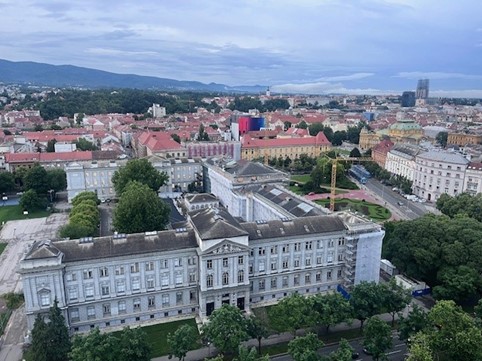 View to the centre from conference hotel Westin in Zagreb, photo by Sini Aalto-Friman
View to the centre from conference hotel Westin in Zagreb, photo by Sini Aalto-Friman
22 May 2024
The opening speeches were by Ms Antonija Gladović, Director of the Agency for Mobility and EU Programmes (AMEUP) and Irina Ferencz who is the Director of Academic Cooperation Association (ACA). The keynote speech and Q&A was by Roxana Chiappa who is an assistant professor at the Universidad de Tarapacá.
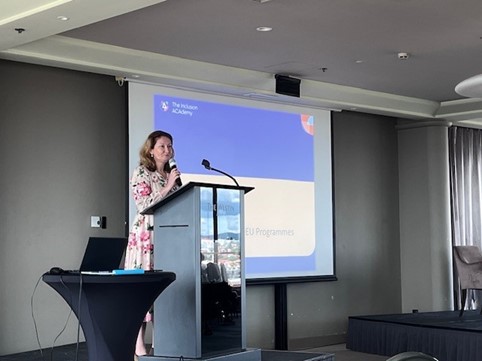 Opening words by Ms Antonija Gladović, Director of the Agency for Mobility and EU Programmes (AMEUP, photo by Sini Aalto-Friman
Opening words by Ms Antonija Gladović, Director of the Agency for Mobility and EU Programmes (AMEUP, photo by Sini Aalto-Friman
After lunch we continued with a panel discussion on multiplicities in the field of DIEB with the speakers:
- Omolabake Fakunle, Director of Equality, Diversity and Inclusion (EDI), University of Edinburgh
- Gertrude Croé, International Coordinator, The University College Léonard de Vinci
- Runar Gunnarson, Director of International Office, University of Akureyri
- Rita Dias, President, Erasmus Student Network
- Abdoulie Jobe, co-founder: Pan-African Association in Croatia, graduated from the University of Zagreb with MA in Sociology and English Literature and Culture
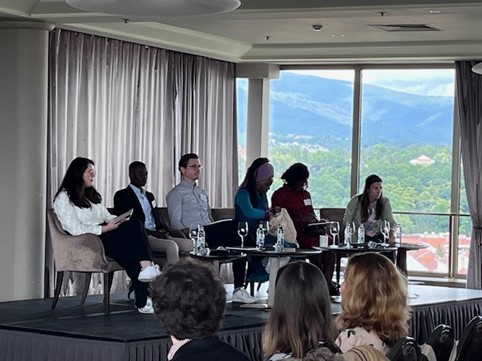 Panel discussion, photo by Sini Aalto-Friman
Panel discussion, photo by Sini Aalto-Friman
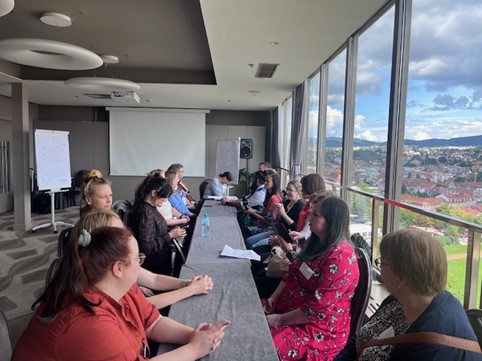 Some of the Finnish participants discussing roadmaps, photo by Sini Aalto-Friman
Some of the Finnish participants discussing roadmaps, photo by Sini Aalto-Friman
In the late afternoon we had workshops and finally dinner.
23 May 2024
The morning started with workshops, round 2 and round 3. The first ones were in mixed groups facilitated by an expert. The representatives made notes of each session and they will be shared later. The last workshop was with the specialists of each country, so we Finns were spread in two groups where we shared tons of ideas for the inclusive internationalization roadmaps.
Some of the Finnish participants discussing roadmaps, photo by Sini Aalto-Friman
After that we heard closing reflections of Adel Rizvi who is the Executive Director, Diaconia University of Applied Sciences’ Student Union. We ended the day with late lunch and said our goodbyes.
Conclusions
Under the moderation of Stela Salliari and through personal stories, this final conference has discussed topics such as institutional and societal belonging, decolonization, and social justice in the context of international education. These topics are interesting and important in the society.
The outcomes of the trainings will be the national-level roadmaps of activities that HEIs and NAs can implement collaboratively to improve the Inclusion & Diversity priority of the Erasmus+ programme. The national agency of Finland (OPH) will publish the roadmap of Finland which we designed in the final conference. They will also open a call for a steering group of experts who will continue with these topics in the national level. The Inclusion Academy was a great starting point for the work ahead. It was clear that the topic is so broad and has many layers into it, so it needs a lot of work in each organization and not just in the international office but in the whole organization. I am happy to continue with these topics in the future.
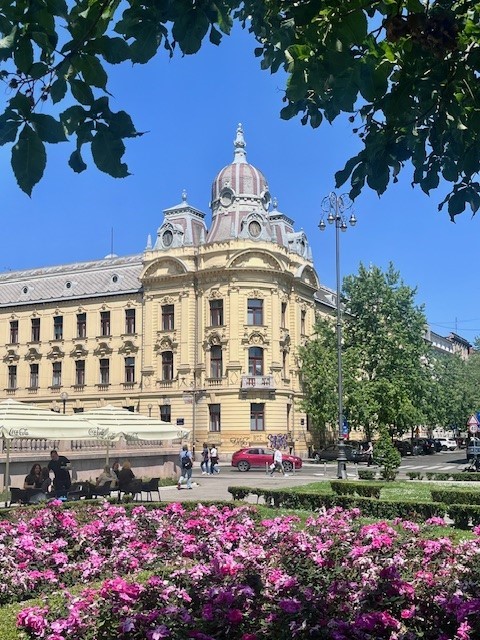 Saying goodbye to Zagreb city for now, photo by Sini Aalto-Friman
Saying goodbye to Zagreb city for now, photo by Sini Aalto-Friman
Sources